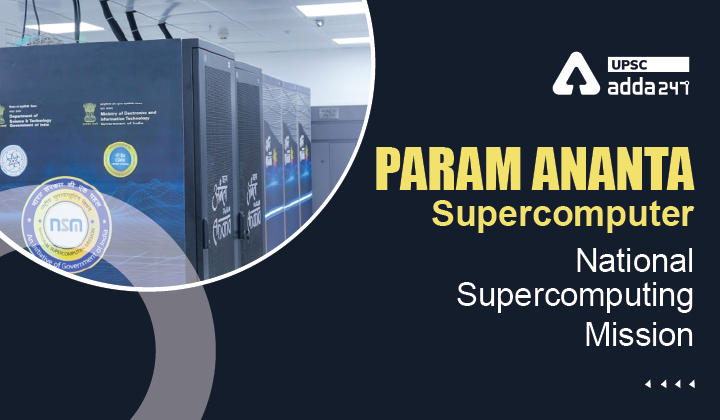Table of Contents
PARAM ANANTA Supercomputer- Relevance for UPSC Exam
- GS Paper 3: Science and Technology- Achievements of Indians in science & technology; indigenization of technology and developing new technology.
PARAM ANANTA Supercomputer in News
- Recently, the PARAM ANANTA Supercomputer was commissioned at IIT Gandhinagar. PARAM ANANTA Supercomputer was dedicated to the nation under National Supercomputing Mission (NSM).
PARAM ANANTA Supercomputer
- About: PARAM ANANTA Supercomputer is a state-of the art Supercomputer built under National Supercomputing Mission (NSM).
- National Supercomputing Mission (NSM) is a joint initiative of Ministry of Electronics and Information Technology (MeitY) and Department of Science and Technology (DST).
- PARAM ANANTA supercomputing facility is established under Phase 2 of the NSM.
- Development: An MoU was signed between IIT Gandhinagar and Centre for Development in Advanced Computing (C-DAC) to establish this 838 TeraFlops Supercomputing Facility under NSM.
- Promoting Atma Nirbhar Bharat: Majority of the components used to build PARAM ANANTA system have been manufactured and assembled within the country, along with an indigenous software stack developed by C-DAC, in line with the Make in India initiative.
- Advantages:
- A portion of the total compute power shall also be shared with the nearby academic and research institutes as per the mandate of NSM.
- NSM has sponsored a number of application research projects using this Supercomputing facility involving researchers for and other Indian institutes and industries.
- PARAM ANANTA Supercomputing facility will provide a major boost to the research and development initiatives in Indian academia and industries to reach a position of global esteem.
Key Features of PARAM ANANTA Supercomputer
- The PARAM ANANTA system is equipped with a mix of CPU nodes, GPU nodes, High Memory nodes, High throughput storage and high performance Infiniband interconnect to cater the computing needs of various scientific and engineering applications.
- PARAM ANANTA system is based on Direct Contact Liquid Cooling technology to obtain a high power usage effectiveness and thereby reducing the operational cost.
- Multiple applications from various scientific domains such as Weather and Climate, Bioinformatics, Computational Chemistry, Molecular Dynamics, Material Sciences, Computational Fluid Dynamics etc. have been installed on the system for the benefit of researchers.
PARAM ANANTA Supercomputer- Key Application Areas
PARAM ANANTA Supercomputing Facility will be of great benefit to IIT Gandhinagar to pursue the Research and Development (R&D) activities in multidisciplinary domains of science and technology at the Institute, including-
- Artificial Intelligence (AI), Machine Learning (ML), and Data Science;
- Computational Fluid Dynamics (CFD);
- Bio-engineering for Genome Sequencing and DNA studies;
- Computational Biology and Bioinformatics used in prediction and detection of gene networks;
- Atomic & Molecular Sciences that helps in understanding how a drug binds to a particular protein;
- Climate Change and Environment studies for extreme weather predictions and simulation of models which can predict the onset of a cyclone;
- Energy studies which will help in carrying out design simulation and optimization of energy conversion devices at various scales;
- Fire Dynamics Simulation;
- Nanotechnology;
- Robotics;
- Applied mathematics;
- Astronomy and Astrophysics;
- Material Sciences;
- Quantum Mechanics;
- Studies on Civil Engineering and structural mechanics to understand the dynamic behaviour of buildings, bridges; and
- Complex structure.
National eVidhan Application (NeVA)
Important Points about National Supercomputing Mission (NSM)
- Mandate: National Supercomputing Mission (NSM) plans to build and deploy 24 facilities with cumulative compute power of more than 64 Petaflops.
- Parent Ministry: National Supercomputing Mission (NSM) is being steered jointly by the Ministry of Electronics & Information Technology (MeiTY) and the Department of Science and Technology (DST).
- Implementation: The National Supercomputing Mission (NSM) is being implemented by the Centre for Development of Advanced Computing (C-DAC) and the Indian Institute of Science (IISc), Bangalore.
- C-DAC has been entrusted the responsibility to design, development, deployment, and commissioning the supercomputing systems under the built approach of NAM.
- Under the build approach, C-DAC is building an indigenous supercomputing ecosystem in a phased manner.
- Performance:Under NSM, till date 15 supercomputers have been installed across the nation with aggregate compute capacity of 24 petaflops.
- All these supercomputers have been manufactured in India and operating on indigenously developed software stack.
-
- More than 36,00,000 computational jobs have been successfully completed by around 3600 researchers across the nation on the NSM systems to date.
- Key Developments: Some of the large-scale applications which are being developed under NSM include the following.
- NSM Platform for Genomics and Drug Discovery.
- Urban Modelling: Science-Based Decision Support Framework to Address Urban Environment Issues (Meteorology, Hydrology, Air Quality).
- Flood Early Warning and Prediction System for River Basins of India.
- HPC Software Suite for Seismic Imaging to aid Oil and Gas Exploration.
- MPPLAB: Telecom Network Optimization.
“PARAM Ganga” Supercomputer | National Supercomputing Mission (NSM)
adda247.com/…/param-ganga-supercomputer-national-supercomputing-mission-nsm





 TSPSC Group 1 Question Paper 2024, Downl...
TSPSC Group 1 Question Paper 2024, Downl...
 TSPSC Group 1 Answer key 2024 Out, Downl...
TSPSC Group 1 Answer key 2024 Out, Downl...
 UPSC Prelims 2024 Question Paper, Downlo...
UPSC Prelims 2024 Question Paper, Downlo...




